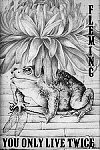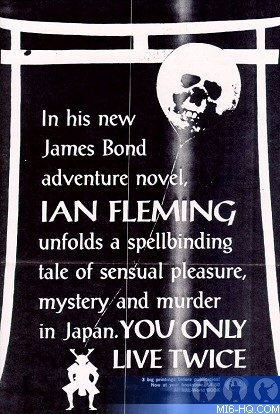 |
| |
MI6 looks back to 1964 at the critical reception
of Ian Fleming's Japanese oeuvre "You Only Live
Twice"...
|
|
Dragon Slaying
28th February 2009
|
James Bond fans had become accustom to Ian
Fleming's style of writing with its thoroughly-researched
travelogue and richly detailed observations. Known as the
'Fleming sweep', "You
Only Live Twice" exercised every
ounce of the author's prowess and delivered a novel that
was not only a 007 adventure, but also an immersive
journey for the reader in to Japanese culture.
Fleming based most of the elements of
his novel on the experiences he had during his journey
across Japan
in
1962, including the Ama girls who dive for pearls and the
intricacies of serving sake.
Due to his skill at communicating
the minutia of a culture, Fleming succeeded in pulling
the wool over the eyes of the producers when they were
adapting this novel for its silver
screen incarnation a couple of years after publication. Scouts could
not find a suitable location for Blofeld's castle of
death. The Japanese did not build castles on the coastline.
It
was purely a figment of Fleming's imagination.
"You Only Live Twice" was published on
16th March 1964 in the UK by Jonathan Cape and in August
1964 by The New American Library in the USA.
Fleming died the same month.
"Twice" was the last novel he fully completed. |
|

Above: 1st edition Jonathan Cape hardback (UK). Artwork
by Richard Chopping.
|
Fleming's death had piqued interest in the book,
but even the author's passing at the time of publication
in the USA, complaints that the book was tired and
formulaic were not uncommon. Anthony Boucher wrote in the
New York Times, "a protracted
but enjoyable travelogue of Japan, towards the end of which the
author
reminds
himself to insert a some action-adventure… but much of
the book seems an exercise in filling pages with no narrative
material." A review in the New Yorker concurred saying "This
book… the next-to-last of the late Mr. Fleming’s,
reports on that bloodthirsty keeper of world peace, James Bond.
It is, unhappily, a tedious and silly one."
Other critical appraisals were kinder. Fellow
NYT reviewer Charles Poore wrote, "It’s
all rich, wonderful stuff, Fleming at his flaming best." But
Poore did not take the series too seriously (inline with Fleming's
self-deprecating view of his work), and added, "Although
I can’t
remember that he was ever boiled in a big beaker of salad oil,
just about everything else has contributed to his partial dismantling."
By now critics had become overly familiar with
the Bond formula and Fleming's style. Poore’s generally
positive review is still filled with phrases like "Bond
now plunges in to his usual world," "the heroine, of
course, is the fixture as before," and "His mission,
of course, concerns the defence of Britain." The repetitive
nature of Fleming's formula was largely undisputed even by those
that enjoyed it.
|

Above: Original print advertisement
(USA)
|
|
Fleming’s death did, however, prompt
at least one reviewer to take the long view, looking at "You
Only Live Twice" and its conventions, not as shortcoming,
but as part of something greater.
Alex Campbell of the
New Republic, almost a year after its publication, gave
the book the closest thing it gets to a completely positive
review. In it, Campbell praises the last installments of
the Bond series, shrugging off their formulaic aspects,
he says that, because of them, "Without further question,
Bond now joins the knightly company of the storybook heroes.
All of them are athletic daring and handsomely virile,
but their mark of distinction is that their patron saint
is George and they chivalrously spend much of their time
saving pretty girls from dragons of one kind or another."
This
is a particularly apt reading of the book, which is set
and Japan, and is actually filled with references to dragon
slaying. And, interestingly enough, it is this exact insight
into James Bond’s almost mythic status that will
come to dominate the later critical interpretation of the
series. |
Advertisements, which appeared in major newspapers
around the time of the book's release read "In his new James
Bond adventure novel, IAN FLEMING unfolds a spellbinding tale
of sensual pleasure, mystery and murder in Japan. YOU ONLY LIVE
TWICE." And then in smaller print "3 big printings
before publication! Now at your bookstore. $4.50 An NAL- World
BOOK."
You Only Twice was the 8th best-selling novel
of 1964, selling approximately 65,000 copies. According to Alice
Payne Hackett and James Henry Burke, in their book, "80
Years of Best Sellers," as of 1975 it had sold a total of
3,283,000 copies.
Review Snippets From 1964
"You Only Live Twice has a decidedly perfunctory
air. Bond can only manage to sleep with his Japanese girl with
the aid of colour pornography. His drinking seems somehow desperate,
and the horrors are too absurd to horrify.. it's all rather
a muddle, and scarcely in the tradition of Secret Service fiction.
Perhaps the earlier novels are better. If so, I shall never know,
having no intention of reading any of them" --
Esquire
"I notice that Ian Fleming has taken a
hint from films of his books and is now inclined to send himself
up. I am not at all sure that he is wise." --
Spectator
"England's best export, a spice of adventure,
a dash of patriotism, laced with sex, sadism, and expense account
know-how" -- Sunday Times
"The characteristic which makes Fleming
appear silly also helps to make him popular: his moral simplicity.
When we read James Bond we know whose side we are on, why we
are on that side, and why we are certain to win. In the real
world this is no longer possible." -- Macleans Magazine
"Must rank among the best of The Bond tales" --
Bookman
Related Articles
 You
Only Live Twice - Literary Coverage
You
Only Live Twice - Literary Coverage